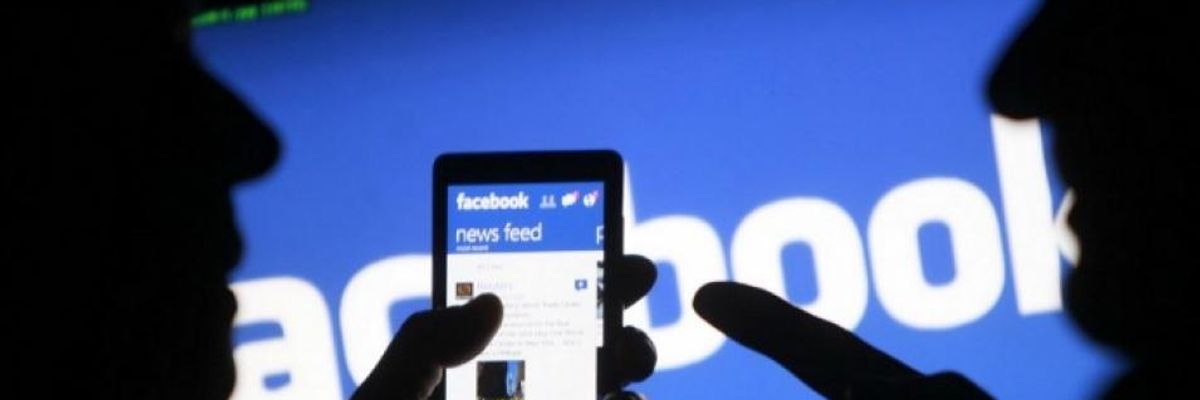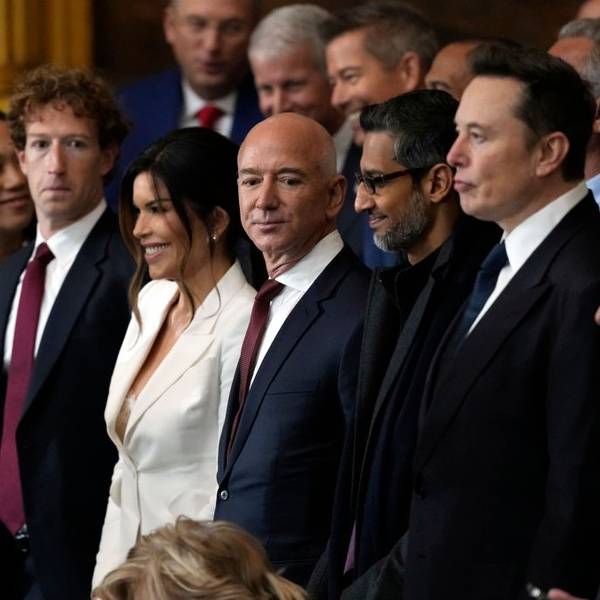
"Facebook clearly can't handle the monster it created, nor does it seem particularly interested in trying," observed the Huffington Post's Ashley Feinberg. (Photo: Legal Loop)
New Reports Reveal How Pro-Trump Firm Cambridge Analytica 'Exploited' Facebook to Harvest Data of 50 Million Users
"This story is a devastating tale of how personal data and massive, unaccountable technology platforms combined with malevolent political interests to subvert the public sphere. Facebook owes us the truth."
Those wondering why Facebook suddenly announced late Friday night that it has banned the Trump-affiliated data firm Cambridge Analytica received a decisive answer Saturday morning, when the New York Times and the London Observer published detailed reports on how the Robert Mercer-funded company exploited Facebook to harvest the personal information of around 50 million Americans without permission--the social media giant's "largest-ever data breach."
"Facebook clearly can't handle the monster it created, nor does it seem particularly interested in trying."
--Ashley Feinberg, Huffington Post
According to the Observer--which cites company documents and former employees--Cambridge Analytica "used personal information taken without authorization in early 2014 to build a system that could profile individual U.S. voters, in order to target them with personalized political advertisements."
These targeting techniques would later form the foundation of Cambridge Analytica's "work on President Trump's campaign in 2016," the TImes notes.
Documents viewed by the Times and the Observer paint a damning picture of Facebook's failure to act when it learned in late 2015 that the personal data of tens of millions of users had been harvested on an "unprecedented scale."
In a statement Friday night, Facebook confirmed that it uncovered Cambridge Analytica's "violation" in 2015, but the Observer notes that "at the time it failed to alert users and took only limited steps to recover and secure the private information of more than 50 million individuals."
The Observer summarizes how the data was collected and utilized:
The data was collected through an app called thisisyourdigitallife, built by academic Aleksandr Kogan, separately from his work at Cambridge University. Through his company Global Science Research (GSR), in collaboration with Cambridge Analytica, hundreds of thousands of users were paid to take a personality test and agreed to have their data collected for academic use.
However, the app also collected the information of the test-takers' Facebook friends, leading to the accumulation of a data pool tens of millions strong. Facebook's "platform policy" allowed only collection of friends data to improve user experience in the app and barred it being sold on or used for advertising.
Cambridge Analytica spent nearly $1 million on data collection, which yielded more than 50 million individual profiles that could be matched to electoral rolls. It then used the test results and Facebook data to build an algorithm that could analyse individual Facebook profiles and determine personality traits linked to voting behaviour.
"We exploited Facebook to harvest millions of people's profiles. And built models to exploit what we knew about them and target their inner demons," Christopher Wylie, who worked with an academic at Cambridge University to collect the data, told the Observer. "That was the basis that the entire company was built on."
Privacy advocates and other commentators reacted with alarm to the explosive new revelations, arguing that they show the dangers inherent in giving massive for-profit tech companies like Facebook access to users' personal information.
"Facebook clearly can't handle the monster it created, nor does it seem particularly interested in trying," concluded the Huffington Post's Ashley Feinberg.
An Urgent Message From Our Co-Founder
Dear Common Dreams reader, The U.S. is on a fast track to authoritarianism like nothing I've ever seen. Meanwhile, corporate news outlets are utterly capitulating to Trump, twisting their coverage to avoid drawing his ire while lining up to stuff cash in his pockets. That's why I believe that Common Dreams is doing the best and most consequential reporting that we've ever done. Our small but mighty team is a progressive reporting powerhouse, covering the news every day that the corporate media never will. Our mission has always been simple: To inform. To inspire. And to ignite change for the common good. Now here's the key piece that I want all our readers to understand: None of this would be possible without your financial support. That's not just some fundraising cliche. It's the absolute and literal truth. We don't accept corporate advertising and never will. We don't have a paywall because we don't think people should be blocked from critical news based on their ability to pay. Everything we do is funded by the donations of readers like you. Will you donate now to help power the nonprofit, independent reporting of Common Dreams? Thank you for being a vital member of our community. Together, we can keep independent journalism alive when it’s needed most. - Craig Brown, Co-founder |
Those wondering why Facebook suddenly announced late Friday night that it has banned the Trump-affiliated data firm Cambridge Analytica received a decisive answer Saturday morning, when the New York Times and the London Observer published detailed reports on how the Robert Mercer-funded company exploited Facebook to harvest the personal information of around 50 million Americans without permission--the social media giant's "largest-ever data breach."
"Facebook clearly can't handle the monster it created, nor does it seem particularly interested in trying."
--Ashley Feinberg, Huffington Post
According to the Observer--which cites company documents and former employees--Cambridge Analytica "used personal information taken without authorization in early 2014 to build a system that could profile individual U.S. voters, in order to target them with personalized political advertisements."
These targeting techniques would later form the foundation of Cambridge Analytica's "work on President Trump's campaign in 2016," the TImes notes.
Documents viewed by the Times and the Observer paint a damning picture of Facebook's failure to act when it learned in late 2015 that the personal data of tens of millions of users had been harvested on an "unprecedented scale."
In a statement Friday night, Facebook confirmed that it uncovered Cambridge Analytica's "violation" in 2015, but the Observer notes that "at the time it failed to alert users and took only limited steps to recover and secure the private information of more than 50 million individuals."
The Observer summarizes how the data was collected and utilized:
The data was collected through an app called thisisyourdigitallife, built by academic Aleksandr Kogan, separately from his work at Cambridge University. Through his company Global Science Research (GSR), in collaboration with Cambridge Analytica, hundreds of thousands of users were paid to take a personality test and agreed to have their data collected for academic use.
However, the app also collected the information of the test-takers' Facebook friends, leading to the accumulation of a data pool tens of millions strong. Facebook's "platform policy" allowed only collection of friends data to improve user experience in the app and barred it being sold on or used for advertising.
Cambridge Analytica spent nearly $1 million on data collection, which yielded more than 50 million individual profiles that could be matched to electoral rolls. It then used the test results and Facebook data to build an algorithm that could analyse individual Facebook profiles and determine personality traits linked to voting behaviour.
"We exploited Facebook to harvest millions of people's profiles. And built models to exploit what we knew about them and target their inner demons," Christopher Wylie, who worked with an academic at Cambridge University to collect the data, told the Observer. "That was the basis that the entire company was built on."
Privacy advocates and other commentators reacted with alarm to the explosive new revelations, arguing that they show the dangers inherent in giving massive for-profit tech companies like Facebook access to users' personal information.
"Facebook clearly can't handle the monster it created, nor does it seem particularly interested in trying," concluded the Huffington Post's Ashley Feinberg.
Those wondering why Facebook suddenly announced late Friday night that it has banned the Trump-affiliated data firm Cambridge Analytica received a decisive answer Saturday morning, when the New York Times and the London Observer published detailed reports on how the Robert Mercer-funded company exploited Facebook to harvest the personal information of around 50 million Americans without permission--the social media giant's "largest-ever data breach."
"Facebook clearly can't handle the monster it created, nor does it seem particularly interested in trying."
--Ashley Feinberg, Huffington Post
According to the Observer--which cites company documents and former employees--Cambridge Analytica "used personal information taken without authorization in early 2014 to build a system that could profile individual U.S. voters, in order to target them with personalized political advertisements."
These targeting techniques would later form the foundation of Cambridge Analytica's "work on President Trump's campaign in 2016," the TImes notes.
Documents viewed by the Times and the Observer paint a damning picture of Facebook's failure to act when it learned in late 2015 that the personal data of tens of millions of users had been harvested on an "unprecedented scale."
In a statement Friday night, Facebook confirmed that it uncovered Cambridge Analytica's "violation" in 2015, but the Observer notes that "at the time it failed to alert users and took only limited steps to recover and secure the private information of more than 50 million individuals."
The Observer summarizes how the data was collected and utilized:
The data was collected through an app called thisisyourdigitallife, built by academic Aleksandr Kogan, separately from his work at Cambridge University. Through his company Global Science Research (GSR), in collaboration with Cambridge Analytica, hundreds of thousands of users were paid to take a personality test and agreed to have their data collected for academic use.
However, the app also collected the information of the test-takers' Facebook friends, leading to the accumulation of a data pool tens of millions strong. Facebook's "platform policy" allowed only collection of friends data to improve user experience in the app and barred it being sold on or used for advertising.
Cambridge Analytica spent nearly $1 million on data collection, which yielded more than 50 million individual profiles that could be matched to electoral rolls. It then used the test results and Facebook data to build an algorithm that could analyse individual Facebook profiles and determine personality traits linked to voting behaviour.
"We exploited Facebook to harvest millions of people's profiles. And built models to exploit what we knew about them and target their inner demons," Christopher Wylie, who worked with an academic at Cambridge University to collect the data, told the Observer. "That was the basis that the entire company was built on."
Privacy advocates and other commentators reacted with alarm to the explosive new revelations, arguing that they show the dangers inherent in giving massive for-profit tech companies like Facebook access to users' personal information.
"Facebook clearly can't handle the monster it created, nor does it seem particularly interested in trying," concluded the Huffington Post's Ashley Feinberg.

